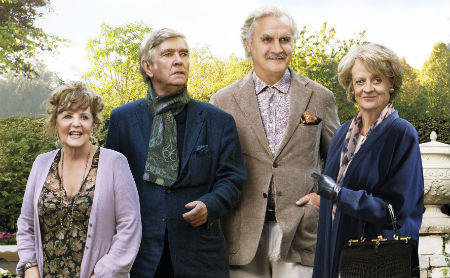The musical quartet was invented to exploit the fundamental registers of the human voice. Its meaning has morphed to denote any art form where variations can be tried on the theme of four. Four is a tidy number. Like voices in a music composition, an effective quartet of characters in a script must interconnect and balance so that anything one character does, causes a complimentary, credible, and compelling reaction from the other three. Reactions from each of those characters in return should result in the same formal, complimentary symmetry. It is not an easy feat to achieve, though the masters make it seems so.
The movie,“Quartet” is a comedy directed by actor Dustin Hoffman and is set in a home for aging musicians. I know—it sounds kind of tame for the wizard that personified youthful alienation as Benjamin Braddock in “The Graduate”, or dragged himself over the razor’s edge as Ratzo Rizzo in “Midnight Cowboy”—roles through which Hoffman established his genius.
Quartet
The man has paid us several lifetimes worth of artistic gold already. The recent Kennedy Center honoree got his start in theater at the Actor’s Studio in 1962 and began attracting critical praise in 1966 for his role as Ventine Brose in “Eh?” by Henry Livings. So it is fitting that a film that is being called his directorial debut is an adaptation from a stage play (from a script by Ronald Harwood). “Quartet,” says Hoffman, “is about living this life.”
His roles in “Lenny”, “Papillon”, “Tootsie” or “Rainman” demonstrate, not only the versatile chameleon and courageous risk taker Dustin Hoffman has always been, but his good judgment in selecting worthwhile projects over the course of a long career. Assembling such a superlative cast for “Quartet” confirms my suspicions that this will be another Dustin Hoffman film we won’t want to miss. It brought cheering crowds to their feet when it premiered at the Toronto International Film Festival.
Dustin Hoffman has scored almost as many victories on the stage as on screen, playing his generation’s definitive Willy Loman in “Death of a Salesman” on Broadway. To be able to project that transition from escapist optimism to spiritual bankruptcy eight shows a week for more than twelve dozen performances requires Michaelangelo-like will. It proves—far more than just a great actor—what a consummate artist he is.
Anyone reluctant to see a film directed by an artist that they’ve only previously ever considered an actor, remember: the Sistine Chapel was painted by an artist that considered himself a sculptor. As for this being Hoffman’s directorial debut, in fact, his first such gig was at a North Dakota theater in 1967 with Saroyan’s “The Time of Your Life,” a script, by the way, full of foursquare passages.
The high spirit Hoffman has always brought to his work makes me eager to discover what he is wrestling with now, in the deeper sense. His “Quartet,” is about an octogenarian opera diva that takes charge by refusing to sing. It is also about a distinguished actor that shows up for a movie and refuses to act.
